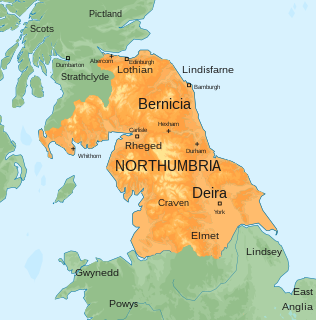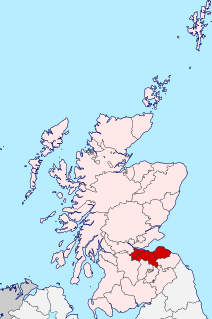See also
- Bernician Series, former term in stratigraphy
- Benicia, California, U.S.
Bernicia was an Anglo-Saxon kingdom in the sixth and seventh centuries.
Bernicia may also refer to:

Northumbria was an early medieval Anglo-Saxon kingdom in what is now Northern England and south-east Scotland.

The Gododdin were a P-Celtic-speaking Brittonic people of north-eastern Britannia, the area known as the Hen Ogledd or Old North, in the sub-Roman period. Descendants of the Votadini, they are best known as the subject of the 6th-century Welsh poem Y Gododdin, which memorialises the Battle of Catraeth and is attributed to Aneirin.
Oswiu, also known as Oswy or Oswig, was King of Bernicia from 642 and of Northumbria from 654 until his death. He is notable for his role at the Synod of Whitby in 664, which ultimately brought the church in Northumbria into conformity with the wider Catholic Church.

Lothian is a region of the Scottish Lowlands, lying between the southern shore of the Firth of Forth and the Lammermuir Hills and the Moorfoot Hills. The principal settlement is the Scottish capital, Edinburgh, while other significant towns include Livingston, Linlithgow, Bathgate, Queensferry, Dalkeith, Bonnyrigg, Penicuik, Musselburgh, Prestonpans, North Berwick, Dunbar, and Haddington.

Edwin, also known as Eadwine or Æduinus, was the King of Deira and Bernicia – which later became known as Northumbria – from about 616 until his death. He converted to Christianity and was baptised in 627; after he fell at the Battle of Hatfield Chase, he was venerated as a saint.

Æthelfrith was King of Bernicia from c. 593 until his death. Around 604 he became the first Bernician king to also rule the neighboring land of Deira, giving him an important place in the development of the later kingdom of Northumbria. He was especially notable for his successes against the Britons and his victory over the Gaels of Dál Riata. Although he was defeated and killed in battle and replaced by a dynastic rival, his line was eventually restored to power in the 630s.
Bernicia was an Anglo-Saxon kingdom established by Anglian settlers of the 6th century in what is now southeastern Scotland and North East England.

Deira, was an area of Post-Roman Britain, and a later Anglian kingdom.
Ælla or Ælle is the first known king of the Anglian kingdom of Deira, which he ruled from around 560 until his death in 588.

Ida is the first known king of the Anglian kingdom of Bernicia, which he ruled from around 547 until his death in 559. Little is known of his life or reign, but he was regarded as the founder of a line from which later Anglo-Saxon kings in this part of northern England and southern Scotland claimed descent. His descendants overcame Brittonic resistance and ultimately founded the powerful kingdom of Northumbria.
Adda or ADDA may refer to:
Bernice may refer to:
Adda was the third known ruler of the Anglo-Saxon Kingdom of Bernicia.
Aethelric or Æþelric was the fourth known king of the Kingdom of Bernicia which he ruled from 568 to 572.
Theodric or Ðeodric ruled from 572 to 579. He was the fifth known ruler of the Anglo-Saxon kingdom of Bernicia.
Hussa was the seventh known ruler of the Anglo-Saxon kingdom of Bernicia, ruling for seven years from about 585 to about 592.
Earl of Northumbria was a title in the Anglo-Danish, late Anglo-Saxon, and early Anglo-Norman period in England. The earldom of Northumbria was the successor of the earldom of Bamburgh. In the seventh century, the Anglo-Saxon kingdoms of Bernicia and Deira were united in the kingdom of Northumbria, but this was destroyed by the Vikings in 867. Southern Northumbria, the former Deira, then became the Viking kingdom of York, while English earls ruled the former northern kingdom of Bernicia from their base at Bamburgh. The northern part of Bernicia was lost to the Scots, probably in the late tenth century. In 1006 Uhtred the Bold was earl of Bamburgh, and Æthelred the Unready appointed him earl of York as well, re-uniting the area of Northumbria still under English control into a single earldom. Uhtred was murdered in 1016, and Cnut then appointed Eric of Hlathir earl of Northumbria at York, but Uhtred's dynasty held onto Bernicia until 1041, when the earldom was again united. A descendant of Uhtred, Gospatric, was appointed earl by William the Conqueror in 1067, but William expelled him in 1072. Gospatric was then given lands in Scotland, and his descendants became earls of Dunbar. The earldom of Northumbria was broken up in the early Norman period and dissolved into the earldoms of York and Northumberland, with much land going to the County Palatine of Durham, which became regarded as separate from Northumberland in the late 13th century.
Alhfrith or Ealhfrith was King of Deira under his father Oswiu, King of Bernicia, from 655 until sometime after 664. Appointed by Oswiu as a subordinate ruler, Alhfrith apparently clashed with his father over religious policy, which came to a head at the Synod of Whitby in 664. After this, Alhfrith disappears from the historical record.
Æthelric is a masculine Anglo-Saxon name that may refer to: